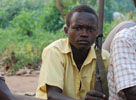
On Jan. 22, a little-known but highly influential group of senior policymakers met in Washington to hash out the next steps for U.S. policy toward Sudan.
Because of the confidential nature of this meeting at the National Security Council, we may never know the exact decisions made, but in the coming weeks we hope to see indications that the Obama administration is willing to ratchet up pressures in Sudan to produce meaningful progress toward peace at a time when a return to large-scale war looks increasingly possible.
While the group, the National Security Council Deputies Committee, was meeting in Washington, here’s what was happening in Sudan:
- Just this month, more than 100 people died in clashes between armed civilians and the southern army, as well as in intertribal fighting in remote areas of the oil-rich south. Last year, violence in southern Sudan resulted in more than 2,500 deaths.
- In Darfur, fresh rounds of aerial bombing by the Sudanese army and ground assaults by Janjaweed militias and Chadian rebels continue to threaten beleaguered Darfuris.
- More than 3 million Darfuris are unable to return to their homes.
In 2005, the ruling National Congress Party in Khartoum signed the landmark Comprehensive Peace Agreement with the Sudan People’s Liberation Army, a southern guerrilla movement that it waged war on for more than two decades. This deal, brokered with a remarkable degree of international engagement, created a blueprint for the "democratic transformation" of Sudan – a country ruled by a series of military dictatorships that have employed systematic, state-sponsored persecution of various populations since independence in 1956.
Today, both of the parties to the 2005 peace deal appear to have abandoned the ideal of democratic transformation. The Khartoum regime in particular is responsible for refusing to reform Sudan’s repressive national security law, which enables the regime to maintain its draconian policies; the regime’s obstinacies are directly to blame for the widely held view that elections scheduled for April will be not be free, fair or credible.
Although the elections have captured the attention of Sudan’s political leaders at the moment, a great deal of work is also needed in the next 11 months to prepare for the historic decision in the hands of southern Sudanese over whether to remain united with the north or form an independent country. Southerners are expected to overwhelmingly vote for independence, but preparations for the south’s self-determination referendum in January 2011 are likely to provoke further disputes between the increasingly distrustful Sudanese leaders.
The international community as a whole deserves a poor grade for neglecting to hold up its end of the bargain and help Sudan prepare for these landmark decisions. The United States has its special envoy, but engagement at a higher diplomatic level, backed by a coalition of countries willing to impose consequences on those who undermine peace, is sorely needed. Given the deteriorating conditions today in Sudan, it is worrisome that the international community has not adopted a coordinated and coherent plan for helping prevent a return to war.
We are optimistic that the U.S. policymakers who met quietly last week in Washington are cognizant of the dire consequences of ignoring Sudan now – not only for the people of Sudan and in the volatile Horn of Africa region, but for U.S. national security interests outside of Africa.
The challenges of 2010 in Sudan cannot be overstated, and the clock is ticking. By the time the NSC Deputies Committee convenes again, the first major milestone or flash point – Sudan’s April elections – will have arrived.
This post originally appeared on AOL News.
Photo: A boy shows off a locally made gun in a camp for displaced people in southern Sudan. (Enough/Laura Heaton)

